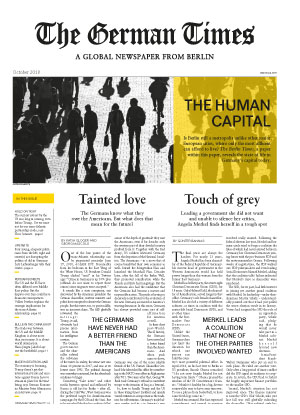Leading a government she did not want and unable to silence her critics, Angela Merkel finds herself in a tough spot

The final years are always the hardest. For nearly 13 years, Angela Merkel has been chancellor of the Federal Republic of Germany. No current head of government in the Western democratic world has held power longer than this woman from the former East Germany.
Merkel has led her party, the center-right Christian Democratic Union (CDU), for 18 years. Only Helmut Kohl, the chancellor of Reunification, served longer in that office. Germany’s sole female chancellor, Merkel has also led a variety of different cabinets, at times in coalition with the center-left Social Democrats (SPD), and at other times with the free-market Free Democrats (FDP).
Unlike the United States, Germany does not limit the duration for which one person can hold the country’s most powerful political office. In April 2016, on his last visit to Berlin as US president, Barack Obama remarked “I do not envy Angela Merkel for not having term limits.” Obama praised the wisdom of the US Constitution’s framers. “I think it’s healthy for a big, diverse country like ours to have some turnover. To use a phrase from basketball, to have some fresh legs come in.”
Merkel was stunned. Her face expressed astonishment, and seemed to question whether saying such a thing was even proper. A number of her close associates who had expressed their intention to leave politics after years of service would later describe a different Angela Merkel. She seemed reflective, they said, as if it might be liberating for her, too, to pass the onus of responsibility on to others.
Following much introspection, she decided otherwise. Now, however, Merkel finds herself in a position that could not be politically more difficult. Public opinion is beginning to turn against Merkel. The chancellor barely reaches anyone with her talking points anymore. She is grappling with – and suffering from – three main problems.
First, Merkel leads a coalition government that none of the other parties involved really wanted. Following the federal election last year, Merkel and her inner circle tried to forge a coalition the likes of which had never existed before in Germany: her Christian Democrats joining forces with the pro-business FDP and the environmentalist Greens. Following weeks of negotiations, the FDP walked out. FDP policymakers and even leading Social Democrats blamed Merkel, adding that the coalition talks’ failure indicated that Merkel’s days as chancellor were numbered.
The SPD, for its part, had little interest in joining yet another grand coalition with Merkel. Its leadership – under then-chairman Martin Schulz – understandably pointed out that it had just polled the worst election result in its history. Voters had assigned the SPD the role of an opposition party, Schulz said, pledging that he would never take part in a Merkel cabinet. Merkel herself favored new elections.
It was President Frank-Walter Steinmeier who put an end to such plans. He ruled out another vote. Only after a long period of inner conflict did the SPD signal its readiness to cooperate. In return, the CDU had to forfeit the hugely important finance portfolio to the smaller SPD.
Second, Merkel’s situation has not improved since. The finance minister is now the SPD’s Olaf Scholz, who just last fall was still gleefully ridiculing the chancellor. “Her political style has apparently reached its limit,” Scholz said. “The time of just muddling through is over.” Now he is vice-chancellor, and many in the SPD believe he is readying to vie for the top job in the next federal election. In the details of government work – which are closely watched in Berlin’s political circles – Scholz is walking away from previous agreements. Pension payments after the year 2040 are just one example. Statements by Scholz have led to counterattacks from Merkel’s CDU. As a result, Merkel came under pressure within her own party and felt constrained to contradict him.
Relations with the Bavarian CSU, the CDU’s so-called sister party, are even worse. Virtually no politician in Germany has rejected Merkel’s refugee policy as stridently as Horst Seehofer, the CSU chairman. “The rule of injustice” is what Seehofer called Merkel’s decision in 2015 to permit hundreds of thousands of migrants to come to Germany. Now Seehofer is interior minister, making him responsible for refugee policy. In his current office he has repeatedly questioned Merkel’s authority on this issue, although Germany’s constitution assigns the task of setting “policy guidelines” to the chancellor.
The chancellery was outraged at Seehofer, not least for his repeated bullying. The constitution grants Merkel the right to fire him. But in reality, she cannot. In dividing the government portfolios among the three parties, the current coalition agreement lets the CSU decide who will be interior minister.
Third, with astonishing frequency and bluntness, as if it were a foregone conclusion, even leading CDU figures predict that Merkel will not run for another term as chancellor in three years. All Berlin talks this way. Sooner or later, Merkel will announce her intention to stand down, they say, although this would break with tradition. For the moment she says nothing on the matter.
None of Merkel’s predecessors have left office of their own accord. All were sent packing against their will. There’s rumbling within Merkel’s conservative parliamentary group. This loose talk further undermines her authority. Governing is getting harder.
Günter Bannas
was parliamentary correspondent and Berlin bureau chief for the Frankfurter Allgemeine Zeitung until March 2018. In June he was awarded the prestigious Theodor Wolff Prize by the Association of German Newspaper Publishers for his life’s work.




